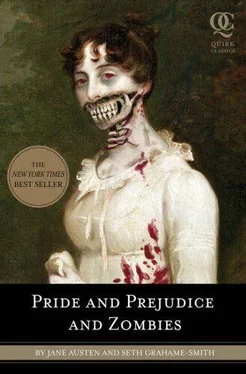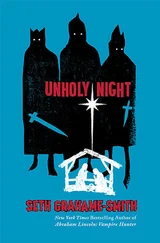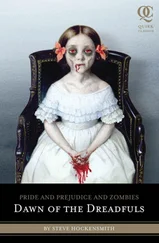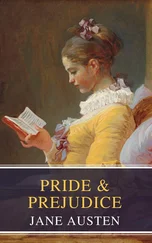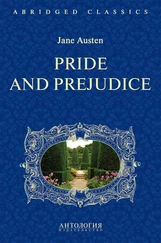Elizabeth shook her head over this letter. Jane was a fine killer, but a deficient judge of character. Indeed, her only weakness was her too-giving heart. Elizabeth was quite convinced that Caroline Bingley had no intentions of telling her brother about the visit, or even Jane’s being in town. Once again, her thoughts turned to the satisfaction of seeing Miss Bingley’s last rubies pour from her neck and down the front of her bodice.
As she predicted, four weeks passed away, and Jane saw nothing of him. She endeavoured to persuade herself that she did not regret it; but she could no longer be blind to Miss Bingley’s inattention. After waiting at home every morning for a fortnight, the visitor did at last appear; but the shortness of her stay and the alteration of her manner would allow Jane to deceive herself no longer. The letter which she wrote to her sister will prove what she felt.
MY DEAREST LIZZY,
You will, I am sure, be incapable of triumphing in your better judgement, at my expense, when I confess myself to have been entirely deceived in Miss Bingley’s regard for me. But, my dear sister, though the event has proved you right, do not think me obstinate if I still assert that my confidence was as natural as your suspicion. Caroline did not return my visit till yesterday; and not a note, not a line, did I receive in the meantime. When she did come, it was very evident that she had no pleasure in it; she made a slight, formal apology, for not calling before, said not a word of wishing to see me again, and was in every respect so altered a creature, that when she went away I was perfectly resolved to follow her into the street and confront her as you suggested, and, had I been appropriately dressed for an outing, I might have. He knows of my being in town, I am certain, from something she said herself; and yet it would seem, by her manner of talking, as if she wanted to persuade herself that he is really partial to Miss Darcy. I can not understand it. If I were not afraid of judging harshly, I should be almost tempted to demand satisfaction. But I will endeavour to banish every painful thought, and think only of what will make me happy-your affection, and the invariable kindness of my dear uncle and aunt. Let me hear from you very soon. Miss Bingley said something of his never returning to Netherfield again, of giving up the house, but not with any certainty. We had better not mention it. I am extremely glad that you have such pleasant accounts from our friends at Hunsford. Pray go to see them, with Sir William and Maria. I am sure you will be very comfortable there.
YOURS, ETC.
This letter gave Elizabeth some pain; but her spirits returned as she considered that Jane would no longer be duped, and that her focus might once again turn to combat. All expectation from the brother was now absolutely over. She would not even wish for a renewal of his attentions. His character sunk on every review of it; and as a punishment for him, as well as a possible advantage to Jane, she seriously hoped he might really soon marry Mr. Darcy’s sister, as by Wickham’s account, she would make him abundantly regret what he had thrown away.
Mrs. Gardiner about this time wrote and reminded Elizabeth of her promise concerning that gentleman, and required information; Elizabeth assured her that his apparent partiality had subsided, his attentions were over, he was the admirer of someone else. The sudden acquisition of ten thousand pounds was the most remarkable charm of the young lady to whom he was now rendering himself agreeable; but Elizabeth, less clearsighted perhaps in this case than in Charlotte’s, did not quarrel with him for his wish of independence. Nothing, on the contrary, could be more natural; and while able to suppose that it cost him a few struggles to relinquish her, she was ready to allow it a wise and desirable measure for both, and could very sincerely wish him happy.
All this was acknowledged to Mrs. Gardiner; and after relating the circumstances, she thus went on: “I am now convinced, my dear aunt, that I have never been much in love; for had I really experienced that pure and elevating passion, I should at present detest his very name, and wish him all manner of evil. But I find my thoughts returning to the protection of our beloved England, for truly there can be no higher purpose; indeed the feelings of one young lady seem rather insignificant in comparison. My talents and my times demand my service, and I believe the Crown more pleased to have me on the front lines than at the altar.”
WITH NO GREATER EVENTS than these in the Longbourn family, and otherwise diversified by little beyond the walks to Meryton (less often interrupted by zombies on account of the hardened earth of winter), did January and February pass away. March was to take Elizabeth to Hunsford. She had not at first thought very seriously of going thither; but Charlotte, she soon found, was struggling to keep the last of her senses, and Elizabeth thought it an appropriate tribute to their former friendship to see her one last time. She found that absence, as well as pity, had also weakened her disgust of Mr. Collins. The journey would moreover give her a peep at Jane; and, in short, as the time drew near, she would have been very sorry for any delay. Everything, however, went on smoothly, and was finally settled. She was to accompany Sir William and his second daughter. The improvement of spending a night in London was added in time, and the plan became perfect as a plan could be.
The farewell between herself and Mr. Wickham was perfectly friendly; on his side even more. His present pursuit could not make him forget that Elizabeth had been the first to excite and to deserve his attention, the first to listen and to pity, the first to be admired.
Her fellow-travellers the next day were not of a kind to make her think him less agreeable. Sir William Lucas, and his daughter Maria, a good-humoured girl, but as empty-headed and untrained as himself, had nothing to say that could be worth hearing, and were listened to with about as much delight as the rattle of the chaise. It was a journey of only twenty-four miles, and they began it so early as to be in Section Six East by noon. The coachman, as was the custom on trips to town, had employed two young men from Meryton to ride beside him with muskets. This was done in spite of the fact that Elizabeth was herself fully armed, and more than capable of defending them should they encounter any unpleasantness.
When they were but three miles from London, and Sir William was prattling on about the particulars of his knighthood for the second time in as many hours, the chaise lurched to a halt. The suddenness of this was enough to send Maria flying from one side of the carriage to the other, and was promptly followed by frightened shouts and the crack of powder outside. Had Elizabeth not been graced with steady nerves and the fortitude of years of combat, she might have gasped upon pulling back one of the curtains-for there were no less than one hundred unmentionables surrounding them on all sides. One of the young musket men had been dragged off the chaise and was being devoured, while the other two living men fired clumsily into the crowd as the hands of the dead pulled at their pant legs. Elizabeth grabbed her Brown Bess and Katana sword and told Sir William and Maria to remain as they were.
She kicked open the door and sprang atop the coach. From here Elizabeth could appreciate the full measure of their predicament, for rather than one hundred unmentionables, she now perceived no less than twice that number. The coachman’s leg was in the possession of several zombies, who were quite close to getting their teeth on his ankle. Seeing no alternative, Elizabeth brought her sword down upon his thigh-amputating the leg, but saving the man. She picked him up with one arm and lowered him into the coach, where he fainted as blood poured forth from his new stump. Sadly, this action prevented her from saving the second musket man, who had been pulled from his perch. He screamed as the dreadfuls held him down and began to tear organs from his living belly and feast upon them. The zombies next turned their attention to the terrified horses. Elizabeth knew that she and the present party were all doomed to slow deaths if the horses should fall into Satan’s hands, so she sprang skyward, firing her musket as she flew through the air, her bullets penetrating the heads of several unmentionables. She landed on her feet beside one of the horses, and with her sword, began cutting down the attackers with all the grace of Aphrodite, and all the ruthlessness of Herod.
Читать дальше
